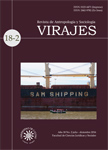Authors
Abstract
Objective. To make a reflection on otherness expressed through traditional indigenous religion; how western culture has determined the knowledge about it and how a diversity of representations and concepts are established in the historical context of the emergence of anthropology and ethnology. Methodology. Examples of the Colombian context will be taken in relation to the natives of the Sierra Nevada of Santa Marta. And a context analysis will be drawn from critical reading. The methodology used in this phase has been the documentary analysis. Results. This paper aims to deepen on traditional indigenous religiosity in the context of the above disciplines, in order to advance in the construction and discussion of some themes of the theoretical framework of doctoral research. Conclusion. The analysis of the different documentary sources allowed to take reflection into the path of otherness in their integration into the modern world and the various ways in which anthropological and ethnological knowledge has determined the forms of thinking and interpreting it.
References
Dussel, Enrique (1996). Europa, modernidad y eurocentrismo. México: Universidad Autónoma Metropolitana Iztapalapa. En: http://enriquedussel.com/txt/1993-236a.pdf. Recuperado de internet en noviembre 1 de 2014.
Giraldo Jaramillo, Natalia (2015). Camino es Espiral. Territorio sagrado y autoridades tradicionales en la comunidad indígena Iku. Manizales: Universidad de Caldas
Lorite Mena, José (1995). Sociedades sin Estado. El pensamiento de los otros. Madrid: Akal
Lenoir, Frederic (2005). Las metamorfosis de dios. Madrid: Ed. Alianza
Lévi-Strauss, Claude (1998). Las estructuras elementales del parentesco. Cap. VI: La ilusión arcaica. Barcelona: Paidós.
Todorov, Tzvetan (1991). Nosotros y los otros. Reflexión sobre la diversidad humana. Ed. Siglo XXI.
Reichel-Dolmatoff, Gerardo (1985). Los kogui. Una tribu de la Sierra Nevada de Santa Marta. Vol. II. Bogotá: Procultura

 PDF (Español)
PDF (Español)
 FLIP
FLIP


















